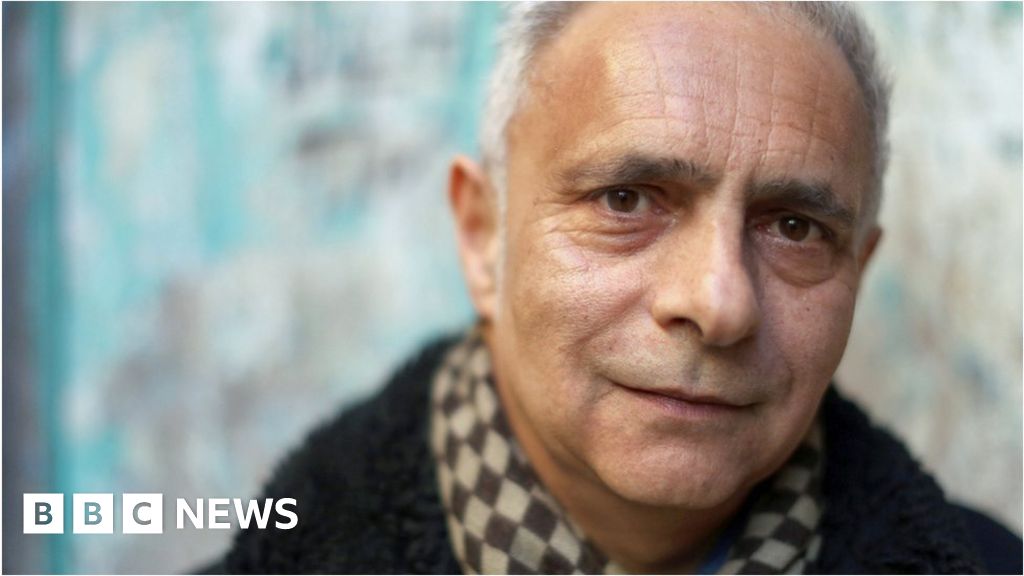The swoop was made with ruthless speed and stealth. It came just as the Muslim preacher was settling down to read his newspaper after enjoying a family lunch.
Shuffling to the front door to see who was banging so loudly, Imam Mahjoub Mahjoubi found himself confronted by 15 plain-clothes police officers.
They had emerged from a convoy of cars and descended without warning on his home in Bagnols-sur-Ceze, a quaint, 13th-century town near Avignon where British tourists often stop off en route to the French Riviera.
After marching inside they ordered the imam (who had lived in France for all but 12 of his 52 years, never troubling to apply for citizenship) to hand over his Tunisian passport.
Then they thrust an official-looking document before him and told him to sign it.
Mahjoub Mahjoubi was sent back to Tunisia for insulting the French flag in a sermon

Mahjoubi with his wife Amira, second left, and their children in France
Mahjoubi, who runs a building firm and gives popular Friday sermons at his local mosque, claims they did not explain the small print contained in this form.
But after he had put his name to it they arrested him, giving him a few moments to collect his belongings before they took him away, ignoring the tearful entreaties of his wife, Almira, and their weeping children, the youngest of whom, a seven-year-old boy, is being treated for cancer.
It was only that evening, after he had been flown to Paris and processed at a police station, Mahjoubi tells me, that he realised he had signed a governmental order bringing an abrupt end to his four decades of residency in France.
Issued by Minister of the Interior Gerald Darmanin — the equivalent of our Home Secretary — under powers bestowed by a tough new Immigration Act which came into force last month, it authorised the imam’s immediate expulsion from his adopted country.
And at 8.30pm, on Thursday, February 22 — just eight hours after that first knock on the door — he was bundled under guard onto an Air France plane bound for Tunis.
So what had this bespectacled, scholarly-looking man done to warrant being exiled with guillotine-like swiftness and finality?
‘One word. Just one, small word,’ he repeated time and again this week, when I posed him that question at his temporary refuge — his in-laws’ house in Soliman, a rundown Mediterranean resort, 15 miles south of the capital.
‘It’s such an injustice!’ he wept, head in hands. ‘For speaking one word my entire world has been destroyed. They have separated me from my wife and children, ruined my business, thrown me out of the country I have lived in for 40 years. A country I love.’
The small word to which he referred is ‘Tricolore’ (or tricolour in English) the name, of course, for the French national flag, with its vertical blue, white and red stripes.
During his weekly sermon, three Fridays ago, Mahjoubi described this unassailable banner — an emblem of Republican democracy since the French Revolution — in terms that would shock and offend many proud Gauls.
Addressing 500 male congregants crammed into a nondescript breeze-block mosque in Bagnols-sur-Ceze (and 12,000 more Facebook followers who watch his weekly sermons, delivered in Arabic and French) he insulted the flag as a devilish symbol that causes division among Muslims.
To translate his exact words, he said that one day, when the world ends, all ruling authorities would fall, and then ‘we will no longer have these Tricolore flags that gangrene us . . . the only value they have is a Satanic value, in the eyes of Allah’.
Imam Mahjoubi now insists that his use of the word ‘Tricolore’ was an unfortunate ‘slip of the tongue’, made when his impassioned sermon was in full flow. When he spoke, he tells me, the African Cup of Nations football tournament was being played in Ivory Coast, and — as a big soccer fan — he had intended to decry the various national flags being brandished confrontationally by rival supporters whose shared Muslim religion ought to have united them.
But instead of saying multi-national, he claimed, he had said Tricolore ‘by mistake’. Could this be true? Or was he being disingenuous?
He certainly seemed contrite when we met, presenting himself as a paragon of tolerance who had spoken out against Islamist atrocities such as the Charlie Hebdo and Bataclan attacks in Paris in 2015.
Yet it stretches the bounds of credulity to accept that this educated imam, who had lived in France since he was 12 and must have been well aware of its deep cultural attachment to the flag, could have made such an elementary error.
Indeed, his protestations of innocence have failed to convince prominent French Muslims who watched videos of the speech, also said to have included passages likely to heighten tensions with the Jewish community, and foster discrimination against women.
This week, the Rector of the Grand Mosque in Paris ‘strongly condemned’ the 40-minute address, saying it ran ‘counter to the principles of peaceful co-existence and mutual respect’ and ‘the values advocated by Islam’.

Mahjoubi said: ‘For speaking one word my entire world has been destroyed. They have separated me from my wife and children, ruined my business, thrown me out of the country I have lived in for 40 years. A country I love.’
The imam’s outburst also shocked Bagnols-sur-Ceze’s mayor, Jean-Yves Chapelet. ‘This is a man I have known for ten years,’ he said. ‘I am completely stunned.’
We can only guess how Imam Mahjoubi’s words were interpreted by his audience that Friday, the majority of whom were young, and presumably impressionable, men.
With anger among already disaffected sections of the French Muslim community heightened by events in Gaza, surely he would have been well advised to avoid saying anything remotely sensitive, let alone cause young people to question their national allegiance and view Jews with enmity?
For these are dark and dangerous times in France. It has become a country where a well-meaning teacher could be beheaded simply for showing a cartoon of the Prophet Muhammad during a lesson in about freedom of expression in 2020.
Where the mood in the grim, high-rise banlieues to which millions of French North Africans are consigned simmers perilously — not only over Palestine but societal inequality and flashpoints such as the fatal shooting last summer of a 17-year-old by police, who had pulled over his car in the Paris suburbs.
A country, moreover, where the avowedly centrist Macron administration is being forced ever further to the Right to retain its popularity among alarmed white voters who increasingly believe the only answer to France’s multicultural woes lies in the hard-line policies of the National Rally (RN).
Founded as the National Front by Jean-Marie Le Pen, whose extremism once rendered him unelectable, the party was renamed by Le Pen’s daughter Marine in 2018. Under her leadership, the RN has now become undeniably mainstream, as recent polls show.
Obliged to flex its muscles in the face of this existential threat, the government has launched a raft of measures designed to demonstrate its determination to combat radical Islamism and reinforce the secularist values of the Republic.
Students have been banned from wearing the abaya, and state subsidies for Muslim schools and colleges cut back. Only this week, the education minister announced plans to close a prominent Muslim academy in Nice, saying its funding was ‘contrary to the anti-separatism law’ introduced in 2021.
Attempts have also been made to introduce immigration quotas and make it harder for incomers to bring their families to France. For the moment, they are being vetoed by the courts.
Not so the law at the centre of this story — the new Immigration Act, which contains some of the government’s most stringent new measures, much to the anger of the liberal Left.
Among them is the right of the authorities to ‘visit’ (a euphemism for raid) the homes of residents deemed to have spoken or acted seditiously, confiscate their national identity documents, and expel them immediately.
When Mahjoubi was deported, last week, the architect of this new law, Interior Minister Darmanin, triumphally cited the imam’s fast-track removal as proof that it will protect the nation from extremist enemies within.
‘No call to hatred will go unanswered,’ he declared, making to sure to emphasise that the preacher’s allegedly inflammatory comments had been reported to the public prosecutor on his personal instructions.
Indeed, Mahjoubi claims the minister was so eager to see him become the first ‘symbolic example’ of the crackdown on radicalism in mosques that he flew from Paris to Nimes to sign the expulsion order himself.
The lightning dismissal of this obscure imam has certainly caught the nation’s attention, sparking handwringing debates on French political talk shows and in highbrow newspapers.
Inevitably, perhaps, opponents such as migrant support group attorneys dismiss the new act as a blatant vote-catcher that wasn’t even necessary to deport Mahjoubi. Powers to expel undesirables in cases of ‘absolute emergency’ were first introduced following World War II, they point out.
Last year, indeed, 44 people linked to radical Islam and deemed to be dangerous were summarily kicked out of France, a 26 per cent increase on 2022.
However, other immigration lawyers say the so-called Darmanin Act undoubtedly hastened Mahjoubi’s repatriation, and it appears to pave the way for others.
Before it came into force, non-citizens could avoid or postpone their removal by destroying — or conveniently ‘losing’ — identity documents, placing the onus on the French authorities to prove their nationality. Legitimising home raids and passport seizures means this ruse will no longer work.
Given the huge obstacles the UK government must overcome before banishing even the most dangerous of resident non-citizens, many would doubtless like to see the British authorities handed similarly tough powers.
One thinks of the 12 years and millions of pounds in legal fees expended to send the poisonous hate-preacher Abu Qatada, whose videos were found in the 9/11 hijackers’ lairs, back to his native Jordan.
Then there is the bureaucratic nightmare of trying to rid these shores of murderers, drug-dealers, robbers and rapists who inveigle their way into the UK and remain here with help of resourceful lawyers and generous legal aid.
But then, when it comes to handling these matters, our countries are not just separated by a Channel. They are oceans apart.
‘The French authorities have a long-standing right to remove someone who is not a French citizen, provided it is to a country that is not unsafe,’ says former Supreme Court judge Lord Sumption. ‘The right to remain in France is a police matter and regarded as discretionary. Britain has a completely different legal tradition.’
Life in Tunisia may be less comfortable than in provincial France, but it is safe enough. So, at the government’s discretion, the imam has been unceremoniously shunted back to the country of his birth.
Had he made those same remarks in a mosque in Birmingham, say, or Bradford, it would probably have been a pointless waste of time for anyone to report him. But is his expulsion justifiable?
While no one I spoke to in Bagnols-sur-Ceze believes he is a hatemonger in the Qatada vein, and his flock (including a Birkenhead-born Muslim with a French-Scouse accent) backed his claim to be a voice of moderation, he was, at the very least, foolish to speak as he did. For unlike Britain, where protesters can — and do — openly abuse the Union Jack in any way they chose, so long as the rectangular cloth belongs to them, France fiercely protects its cherished Tricolore.
Designed by revolutionaries in 1790 as a contrast to the elaborate pennants flown by the nobility, its three simple stripes have since been copied by many other nations, including Italy, Germany, Ireland and India.
As in many other countries, desecration of the national flag is an imprisonable offence (in Turkey, the maximum sentence is 18 years). As Mahjoubi ought to have known, even to disrespect it verbally at a public gathering can have serious consequences.
Moreover, having already been taken to task for teaching local children religious lessons inside the mosque complex — in breach of French law governing the use of municipal buildings — he should have realised his videoed speeches were being monitored by the regional authorities, which is how his inflammatory words came to their attention.
In fact, by some accounts they had previously warned him to temper his fervid speeches.
Mahjoubi denies this.
True or not, on the Friday in question he went too far, not only appearing to damn the Tricolore but allegedly branding Jews as ‘the enemy’ and calling for the destruction of Western society.
Putting his side of the story to me this week, during a lengthy interview in his Tunisian in-laws’ whitewashed villa, the imam rejected every such claim.
When alluding to the national flag, Jewish people and the female sex, he maintained, he had been quoting from Islamic scriptures that envisage scenes on the final day of reckoning.
Had his words been interpreted in that context, instead of being applied to contemporary France, no one could possibly have been offended or incited to hatred.
Why, then, had he been singled out? Because, he said in a whispery voice that contrasted starkly with the stridently excitable tones one hears on his videos, the Interior Minister was vaunting his new law and needed ‘a scapegoat’.
‘It was only a word, just one misplaced word,’ he says again, though whole passages of his speech were cited as grounds for his expulsion.
‘I was the first to suffer but it (the new law) will do a lot of damage to Muslims. I think imams will have to be really, really careful about what they are saying from now on.’
Quite so, and many would suggest that is no bad thing.
As I am leaving this woebegone man, he espouses his admiration for Britain.
Though he hasn’t been to our country, he praises its tolerance, and a system that allows independent judges, rather than politicians, to rule on cases such as his. So much fairer, he muses, than in France.
‘They would never do this to an imam in England. A minister wouldn’t be allowed to throw me out. I’d have the chance to defend myself in court.’
With dollops of unwitting bathos, he fixes me with a meaningful gaze and adds: ‘So, I appeal to King Charles — and I hope he soon gets better — to help me!’
Perhaps the imam’s Anglophile outpouring was sincere. A cynic might suspect it to have been affected in the hope of winning the Daily Mail’s sympathy.
Last night his legal team in Paris launched a last-ditch challenge to bring him home from Tunisia.
Yet his gushing homage to Britain, with its more clement form of justice, is unlikely to have warmed French patriots to his dubious cause.

Emily Foster is a globe-trotting journalist based in the UK. Her articles offer readers a global perspective on international events, exploring complex geopolitical issues and providing a nuanced view of the world’s most pressing challenges.








